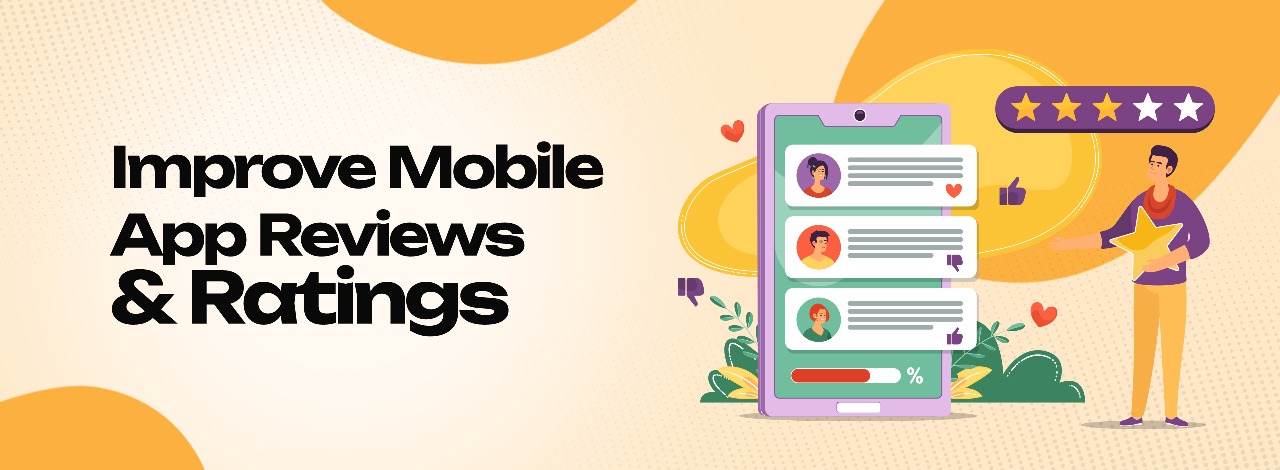


Improve Mobile App Reviews & Ratings
In today's digital-first world, the success of a mobile app is largely determined by its user reviews and ratings. These metrics directly influence user trust, app visibility in stores, and download rates. Improving mobile app reviews and ratings is crucial not just for credibility but also for long-term growth and monetization.
In this blog, we will explore actionable strategies to enhance your app's reputation and consistently earn higher ratings from users.
Why Mobile App Reviews & Ratings Matter
User ratings and reviews impact more than just public perception. Here's why they're vital:
- App Store Ranking: Higher ratings help your app rank better in the App Store and Google Play.
- User Trust: Good reviews create trust and encourage more downloads.
- Feedback Loop: Reviews offer insight into what users like or dislike, helping with future updates.
Optimize Onboarding Experience
First Impressions Count
The user onboarding experience is the first interaction a user has with your app. If the process is confusing or sluggish, users may leave negative feedback or uninstall the app altogether.
Tips to improve onboarding:
- Keep the steps short and focused.
- Use animations or tooltips for guided tours.
- Avoid mandatory signups unless absolutely necessary.
Provide Value Immediately
Make sure the core value of your app is clear within the first few minutes of use. When users understand the benefits right away, they're more likely to leave positive reviews.

Use In-App Prompts Strategically
Timing is Everything
Asking users to rate your app too early or during a frustrating moment can backfire. Instead, time your review prompts after a positive interaction---like completing a level or achieving a milestone.
Best practices for in-app prompts:
- Don't interrupt critical app functions.
- Wait until the user has used the app a few times.
- Offer a "Remind me later" option.
Segment Your Audience
Use analytics to understand user behavior. For example, if a user spends more than 10 minutes daily on the app, they're likely a happy user---and more likely to give a positive review.
Actively Encourage Positive Reviews
Incentivize Feedback (Carefully)
While you should never buy reviews, you can incentivize users by offering value in exchange for feedback---like bonus content, discounts, or loyalty points.
Examples:
- "Enjoying the app? Leave us a review and unlock a free feature!"
- "We value your opinion! Rate us and get 10% off your next purchase."
Note: Follow Google Play and Apple App Store guidelines to avoid violations.
Use Email & Push Notifications
Send polite, personalized messages to users asking for their feedback outside the app. This allows you to address concerns privately before they become public.

Handle Negative Reviews Gracefully
Respond Promptly
Address user complaints quickly and professionally. This shows potential users that you're actively engaged and care about user experience.
Response template:
"Hi [Username], we're sorry to hear you had this experience. Please email us at [support@yourapp.com] so we can make it right."
Use Feedback to Improve
Look for common themes in low-rated reviews. If users frequently mention bugs or UI issues, prioritize those fixes in the next update.
Regularly Update the App
Fix Bugs Quickly
Nothing frustrates users more than persistent bugs. Regularly update your app to fix issues and maintain compatibility with the latest OS versions.
Highlight Changes in Changelogs
Be transparent about updates. Clearly mention bug fixes, new features, or performance enhancements in your app's changelog to let users know you're actively improving the app.
Leverage Social Proof
Display User Testimonials
Highlight positive reviews in your app description or on your website. Social proof builds credibility and encourages new users to try the app.
Example:
"This app has made my workflow 10x faster!" -- Raj, Verified User
Use Influencer Endorsements
Collaborate with trusted influencers to share honest reviews. Their followers are more likely to install and positively rate your app if they trust the source.
Create a Seamless Support System
Offer In-App Support
Users are less likely to leave negative reviews if they can get help easily. Use in-app chat or a dedicated FAQ section to resolve issues quickly.
Direct Complaints Away from Public Platforms
When users have complaints, guide them to contact support rather than vent on the Play Store. A simple message like "Need help? Reach us through the Help tab!" can divert potential bad reviews.

Monitor Review Trends and Analytics
Use App Store Tools
Use tools like Google Play Console and App Store Connect to monitor reviews and analyze trends. Identify:
- Review volume over time
- Keywords in feedback
- Feature requests or issues
A/B Test Review Prompts
Experiment with different styles, timings, and wording of review prompts. A/B testing can help you identify the most effective way to solicit feedback.
Build a Loyal User Community
Engage Users Through Social Media
Create active social channels where users can share experiences, get updates, and feel like part of a community. A loyal user base is more likely to leave glowing reviews.
Run Feedback Campaigns
Host campaigns like "Tell us what you think!" or "We're listening!" to gather feedback in a friendly, inclusive way. Make users feel heard and valued.

Final Thoughts
Improving your mobile app's reviews and ratings isn't just a technical challenge---it's a holistic process that includes design, user engagement, customer service, and continuous optimization. By focusing on the user experience, responding to feedback, and building a loyal community, you can transform your app's reputation and drive sustainable growth.
Make app ratings work for you, not against you---and turn every user into a brand advocate.
Frequently Asked Questions
When is the best time to ask for a review?
Ask for a review after a user completes a positive action, like finishing a task or using the app multiple times without issues.
Can I offer rewards for app reviews?
You can encourage reviews with rewards, but avoid directly exchanging incentives for positive ratings. Always follow App Store and Google Play guidelines.
How do I handle negative reviews?
Respond politely, acknowledge the issue, and offer support or a solution. This shows you care and can improve public perception.
What tools help track app reviews and ratings?
Use platforms like Google Play Console, App Store Connect, and third-party tools like Appbot or Sensor Tower to monitor reviews.
How often should I update my app?
Update regularly---every few weeks if possible---to fix bugs, add features, and show users that the app is actively maintained.
